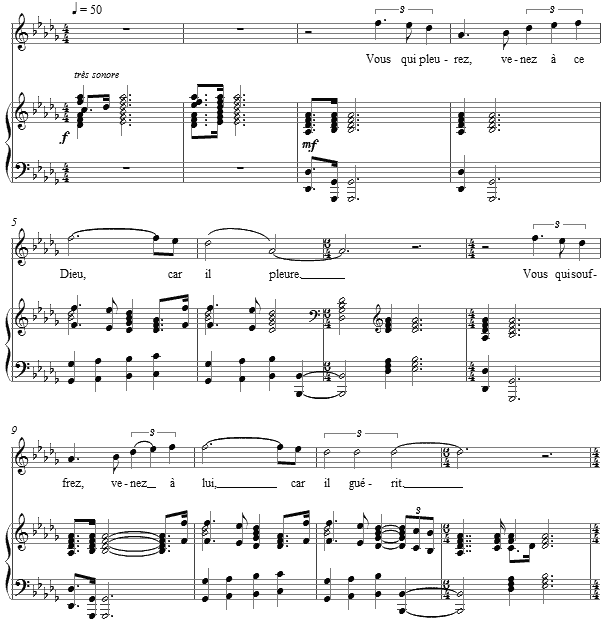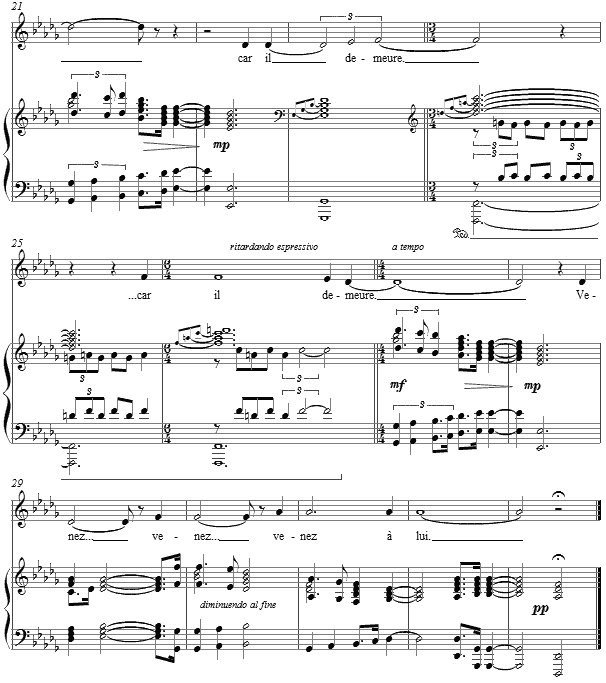Music and Texts of GARY BACHLUND
Vocal Music | Piano | Organ | Chamber Music | Orchestral | Articles and Commentary | Poems and Stories | Miscellany | FAQs
Venez à lui - (2008)
Victor Hugo
for medium voice and piano
pour Joseph Groben
Vous qui pleurez, venez à ce Dieu, car il pleure.
Vous qui souffrez, venez à lui, car il guérit.
Vous qui tremblez, venez à lui, car il sourit.
Vous qui passez, venez à lui, car il demeure.[ 2 pages, circa 2' 50" ]
Victor Hugo
You who weep, come to God because he too weeps.
You who suffer, come to him because he heals.
You who fear, come to him because he smiles.
You who pass, come to him because he abides.
The text is properly titled, "Écrit au bas d'un crucifix," ("Written at the bottom of a crucifix") from Hugo's Les contemplations, the poem dated 1842. The verse is in four sentences, such that the setting offers four variations on the gestures which make melodic the sense of the text. A fulcrum between tonic and subdominant is the large feature of the accompaniment, as the vocal line falls to rise and fall again, sketching out the tonic against the subdominant.
The last of the statements slips from the subdominant to a sweet and temporary mediant major, as the F of the bass awaits rising again to the subdominant G flat. It is the reason to again restate the final phrase of the poem, "car il demeure." Because "he" abides, the text testifies, for those who weep, suffer and fear.
Joseph Groben
Joseph Groben, born in 1935 in Luxembourg, studied German in Vienna), Romance in Paris at the Sorbonne, and Slavic studies in Moscow. He was a senior lecturer at Lycee des Garçons, Luxembourg, and professor at the Center Universitaire de Luxembourg until 1999. He founded the chamber orchestra "Les Musiciens" in Luxembourg, and is author of Requiem für ein Kind - Trauer und Trost berühmter Eltern (Köln, Dittrich Verklag, 2001), Mosella : Monographie historique et culturelle (2004), and the cultural and historical monograph, "Luxembourg and Greater Region" (2007).
I had a message from Joseph Groben about my setting of Hugo's Demain des l'aube, which he wished to include on a concert program. I allowed this and as thanks he sent me his fine text, Requiem for a Child (Requiem für ein Kind ). Tracing the "sadness and solace of famous parents" Groben tells of mourning in over fifty cases documented by means of biographical sketches. From Cicero, to writers like Dostoyevsky, Eichendorff, Goethe, Hugo, Lasker-Schüler, Storm to musicians such as Berlioz, Haydn, Dvorak, Mahler, Schumann and Smetana, and scientists, philosophers, kings and emperors, this book gives an insight into the private grief of famous personalities. As my thanks, I came to found this text above, and set it with a dedication to him as an art song. The answers to grief come so well through both faith and time.
The score for Venez à lui is available as a free PDF download, though any major commercial performance or recording of the work is prohibited without prior arrangement with the composer. Click on the graphic below for this piano-vocal score.



